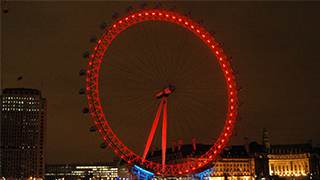British landmarks lit for victims of persecution

A number of British landmarks were floodlit in red this past Wednesday, to honour and acknowledge those who are suffering persecution for their faith around the world.
The event, dubbed 'Red Wednesday', saw buildings such as Westminster Abbey and Lambeth Palace lit to draw attention to the plight of Christians and other faith groups who are being persecuted. The date was chosen to coincide with Saint Clement's Day, which celebrates the early Pope and Christian martyrs.
It also came ahead of the publication of a major parliamentary report, published on 24 November by Catholic group Aid for the Church in Need (ACN). The report warned that religious freedom is now under threat in one in five countries.
The report follows previous data showing that Christians are the most persecuted faith group in the world – the victims of around 80% of all religious discrimination.
Greatest persecution in Muslim nations
The Religious Freedom in the World report looked at 196 countries. It highlighted 38 countries in which there have been significant violations of religious freedom in the last two years.
The global study confirmed previous data that shows that the greatest curbs on religious freedoms in Africa, the Middle East and South Asia take place in Muslim-majority countries.
It found that out of the 11 countries experiencing worsening persecution, nine were under "extreme pressure from Islamist violence", and seven of these experienced persecution at the hands of both militant groups and state-sponsored oppression.
It also noted substantial discrimination against Christians in communist societies such China and North Korea, in India from Hindu nationalists, and from Buddhist nations like Burma.
Islamic 'hyper-extremism'
The report discusses a phenomenon it refers to as 'hyper-extremism', seen in groups like ISIS.
ACN describes this as a radical creed, combined with systematic attempts to drive out groups who do not conform to their beliefs. Hyper-extremism involves mass killings "glorying in the brutality inflicted on its victims, which is paraded on social media".
The study stated: "A virulent and extremist form of Islam emerged as the number-one threat to religious freedom.
"It emerged that a massive upsurge in violence and instability linked to Islamism had played a significant role in creating an explosion in the number of refugees."
John Pontifex, who edited the report, said: "The atrocities committed by these aggressive Islamist groups in Syria, Iraq, Libya and by their affiliates elsewhere have arguably been one of the greatest setbacks for religious freedom since the Second World War. What has properly been described as genocide, according to a UN convention which uses that term, is a phenomenon of religious extremism almost beyond compare."
Campaign raises awareness of suffering
John Pontifex said the Red Wednesday campaign is "an opportunity for us to remember that there are many thousands of people, not least Christians but also people of other faiths, being killed or persecuted because of the faith that they profess and this is just not recognised."
He added: "Red is the appropriate colour because of the blood that is spilt."
The General Bishop of the Coptic Orthodox Church in the UK, Anba Angaelos, commented on the campaign: "At a time in our contemporary history when we must be most aware of rights and liberties given by God and enshrined in various laws and international conventions, it is unfathomable that some still suffer, are marginalised and persecuted, for the faith they choose to hold, or even reject."
Parliament discusses plight of Christians in Iraq
The Red Wednesday campaign was the subject of a short debate in the House of Commons last week.
Parliamentarian Chris Green, moving the debate, warned particularly of the plight of Christians in Iraq: "The Christian community in Iraq is one of the oldest in the world, dating back to the first century. There were thought to be 1.5 million Christians in Iraq before the invasion in 2003.
"However, that number is reported to have fallen now to about 230,000. Although many people have been persecuted and have fled the region, that figure shows the targeted nature of the persecution and, if it carries on in that direction, we will soon see the end of Christianity in much of the middle east."
'Freedom of religion makes the world safer'
Minister Tobias Ellwood, responding to the debate, said the British government "will continue to fight for the freedom of religion or belief internationally."
He continued: "We do so not only because it is right and is enshrined in the universal declaration of human rights and in article 18 of the international covenant on civil and political rights but because extending freedom of religion or belief to more countries and more societies helps to make the world safer and more prosperous, which is in all our interests."
Related links:
Westminster lit up for victims for violence (Telegraph)
Shocking rise in religious persecution fuelled by 'Islamist Hyper-Extremism' – Report (Christian Today)
After ISIS, there are more horrors to come (Catholic Herald)
